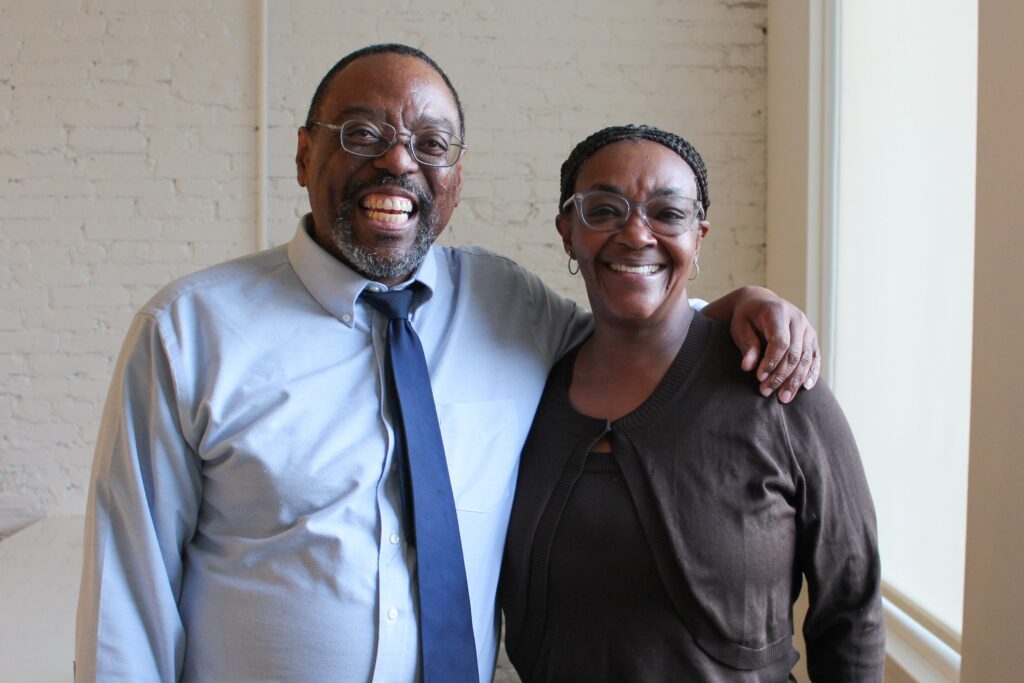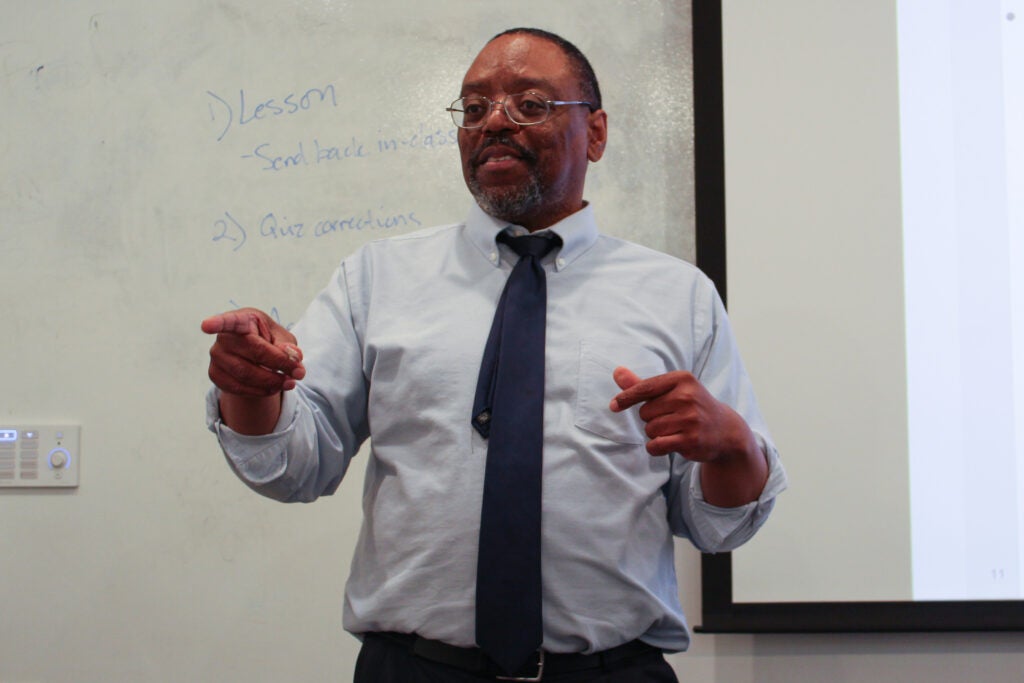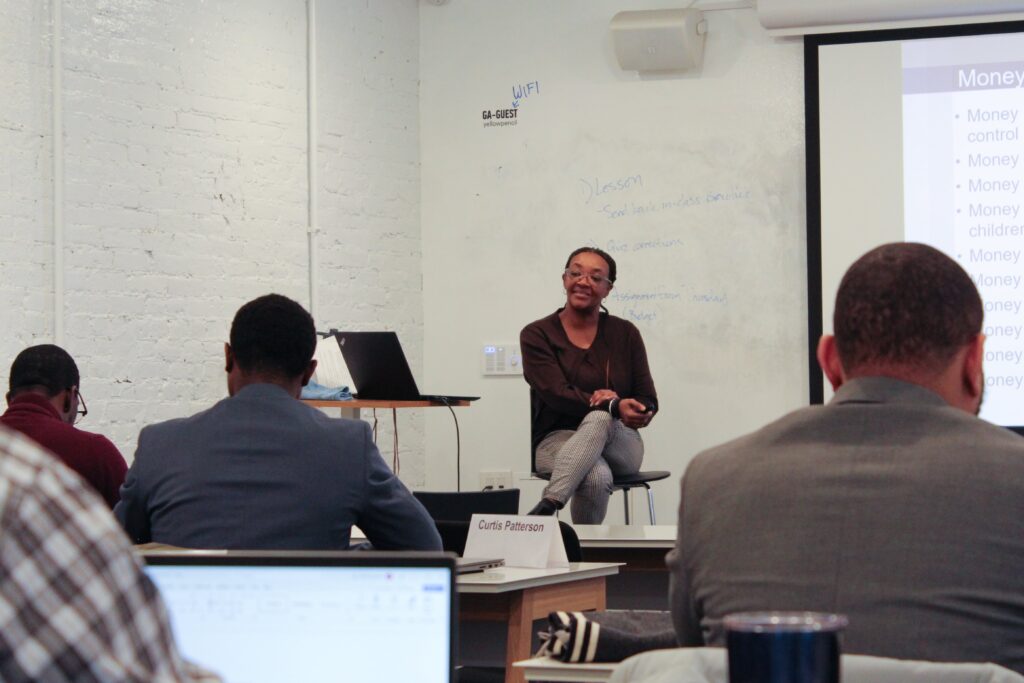Pivot Fellows Explore Two Sides of Personal Finance in Unique Course
Posted in News

George and Joy Comer know that people don’t make financial decisions based on the numbers alone. “Money is emotional,” they say.
Their message resonates with the Georgetown Pivot Program Fellows, who often face added emotional, social, family, and financial pressures as returning citizens still finding their footing after returning home from incarceration.
In 2021, Pivot Program Founding Director Pietra Rivoli approached George Comer, a longtime McDonough School of Business faculty member, co-director of the Georgetown Reach Program, and McDonough Director of Underrepresented Minority Student Support, about bringing a comprehensive personal finance course to Pivot.
“One of the things that I noticed as they were doing their budgets was that they were struggling with some of the emotional parts of money,” George Comer recalls thinking after his first few class meetings with Pivot Fellows.
Comer knew the perfect person who could address some of those trickier questions: his wife, Joy. So the duo expanded on the Pivot Program’s initial vision for the class, landing on a two-pronged approach that tackles the more typical personal finance topics of budgeting, interest rates, investments, and savings, but also the tougher questions surrounding money.
Joy Comer explores how a person’s past may influence their spending behavior and how they can say no to family members or friends who ask for financial support, among other topics.
“I think that really helps them a lot knowing that they’re not the only ones that have problems, but so many other people have problems dealing with money and the emotional aspects of it, because money is very emotional,” she says.
One of the pair’s biggest lessons for the Pivot Fellows is to develop a value system that can keep them grounded as they navigate tough financial decisions.

“What we all have to understand is that we can’t do everything. So you need to prioritize,” George Comer says. “Figure out in your own value system what’s most important to you and order those things in terms of importance. Then develop the power to say no as you go down your list.”
The Comers say that for most people, having frank discussions about money is new territory.
“I think our biggest contribution is demystifying it from just a personal standpoint where we can have those conversations about money that they never really had and that most of society doesn’t have,” George Comer says.
That was true of Pivot Fellow Kelli Davis, who says the open class conversations and lessons “took the mystery out of discussing finances.”
“For most of the cohort, myself included, we were never taught personal finances in our homes, and when we became adults, we made some poor financial decisions. And others have never been in a situation where they had to budget or handle their personal finances,” Davis says. “Being equipped with the tools to handle your personal finances is a pivot in the right direction.”
To add to the transparency the Comers bring into their classes, they also invite other distinguished finance experts from academia and business as guest speakers, including leading faculty and staff of color from Georgetown, Howard University, and Morgan State University. Each speaker shares their own advice and best practices, but also has to answer another question: What was their biggest financial mistake?

“Understanding how much people do make bad financial decisions, even when they have great financial knowledge, helps the Fellows understand you shouldn’t beat yourself up over some of your past decisions,” George Comer says.
One of the other key lessons that the Comers try to instill in the students is to not leave valuable opportunities on the table. “If it’s free, it’s for me,” has become the unofficial motto of the course.
At the end of the class, each Fellow presents their own financial plan, which includes short-term and long-term financial goals, priorities, and plans for savings and an emergency fund. The hope is that as they graduate from Pivot and enter full-time careers or work to launch their own businesses, the Fellows will have the tools and knowledge they need to make thoughtful and purposeful financial decisions.
“I learned how to wisely invest the money I had sitting in my savings account,” Davis says. “And I have set an attainable goal to have all of my old debt paid off by the end of 2023.”
Working with two cohorts of Pivot Fellows has also been a learning experience for the Comers.
“This has really opened my eyes and also given me a different understanding,” Joy Comer says. “It just humbled me in a big way seeing how hard they work and coming from where they came from. I tell them all the time that I’m so proud of them, and I try to tell them that because I’m not sure how many of them have heard that before.”
